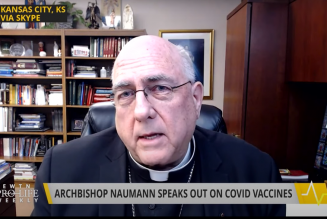I have to confess that when the news broke last night and I read that careful, exhaustive, impressive opinion from Justice Alito, my eye moved to those key points for which I was looking, and there I fell into a mild despair. For the Justice preserved, as one of the defining strands of his opinion, that the human standing of the child in the womb would be left as a matter merely of belief. And as one justice put it a while back, the people in the States may simply be invited to mull over their “value judgment” on when that child in the womb becomes human—and how much they would “value” the protection of that child.
But it became clearer to me last night that any disappointment of mine should be overborne by the vast good that Samuel Alito accomplishes here. Alito has carefully crafted his opinion within a cast moderation, which should diminish the anxieties of people on the other side that a decision overruling Roe would sweep away in a stroke that right to abortion they have come to see as one of the “first freedoms” in their lives.
Samuel Alito showed us here how a demanding moral reasoning on this matter would have to be tempered in what could only be called a consummate act of statecraft. Alito does what I’ve complained for years that White and Rehnquist, the dissenters in Roe. never did: he draws upon the precise facts about the development of that small human being in the womb.
Indeed, he supplied almost all of the substantive arguments that I’d want the Court to make. But he covered them over with the persistent concession that a large portion of opinion in this country did not exactly see things in this way—that the objective, inescapable human standing of the child in the womb was still a matter of “belief,” with no claim to be accepted by anyone who doesn’t share that belief.
And so what was the dominant purpose of writing in this way?: The firestorm of opposition is bound to inflame with the non-truth that this decision will do away with the right to abortion throughout the country. The justice is trying to write strongly to make the point that it does not.

In the meantime, he has provided all of the evidence and most of the reasoning to show why it is utterly untenable to claim that this offspring in the womb is anything other than a human being from its first moments. He leaves us then to draw the conclusion that should be obvious, to those open to seeing: that this child in the womb deserves the protection we would accord to all other human lives under the laws on homicide. We would leave it then to the States to determine just how quickly, or fully, that protection is extended.
The apt comparison comes with Macauley’s memorable account of the Toleration Act in England:
The sound principle undoubtedly is, that mere theological error ought not to be punished by the civil magistrate. This principle the Toleration Act not only does not recognize, but positively disclaims. Not a single one of the cruel laws enacted against nonconformists by the Tudors or the Stuarts is repealed. Persecution continues to be the general rule. Toleration is the exception. . . .These are some of the obvious faults which must strike every person who examines the Toleration Act by that standard of just reason which is the same in all countries and in all ages. . . .That the provisions which have been recapitulated are cumbersome, puerile, inconsistent with each other, inconsistent with the true theory of religious liberty, must be acknowledged. All that can be said in their defense is this; that they removed a vast mass of evil without shocking the vast mass of prejudice.
Samuel Alito’s crafted opinion strikes at a vast body of evil—a lethal evil, massive in its scale—but at the same time it holds out an assurance that this “right,” which some people see as bound up with nothing less than their personal freedom—that this right will remain secure for them.
Nevertheless the reaction from the defenders of abortion will still come in a firestorm. And what would we expect from the people who see a law in Florida, supporting parents, trying to shelter small children from a bewildering instruction in gender identity—and then portray that law as an attack on children and the transgendered? These people will not be mollified by a carefully crafted opinion, taking a generous posture of tolerance. But the willingness to make that gesture in a carefully written and judicious opinion does as much as the very gravity of the situation—and the politically combustible state of the county—would have us pray that the judges do.
Still, the willingness to step away, in prudence, from the more demanding moral arguments may impart some lingering doubts. The opposition, we know, will not be placated, or drawn by Alito’s moderation. And the media will not report the reasoning; they will report the box score of the vote and the bottom line—that the right to abortion is indeed being removed now as a constitutional right that people don’t lose when they shift their residence from one State to another.
But in that case we may plausibly ask: If the teaching of moderation will induce no reciprocating moderation, then why turn away from an opinion that gives a more lasting, morally coherent account of what the Court is doing? That kind of account would not only affect the way we understand ourselves at this moment. It would also establish the firmer ground for the Congress, as well the pro-life movement in the States, if we seek now to take the next step and seek to extend those protections of the law for the unborn child. In the meantime, the deeply thoughtful and comprehensive opinion by Justice Alito is a craft of legal workmanship, and it likely offers the most judicious statement that could probably be offered right now on this vexing matter, which has so deeply divided the country and his own bench.
A slightly different version of this column is also being published by The American Mind of the Claremont Institute, which we thank, along with Professor Arkes, for permission to use it as well.
*Image: Associate Justice Samuel Alito sits during a group photo at the Supreme Court in Washington, April 23, 2021. [Erin Schaff/The New York Times via AP/Politico]
Join Our Telegram Group : Salvation & Prosperity









